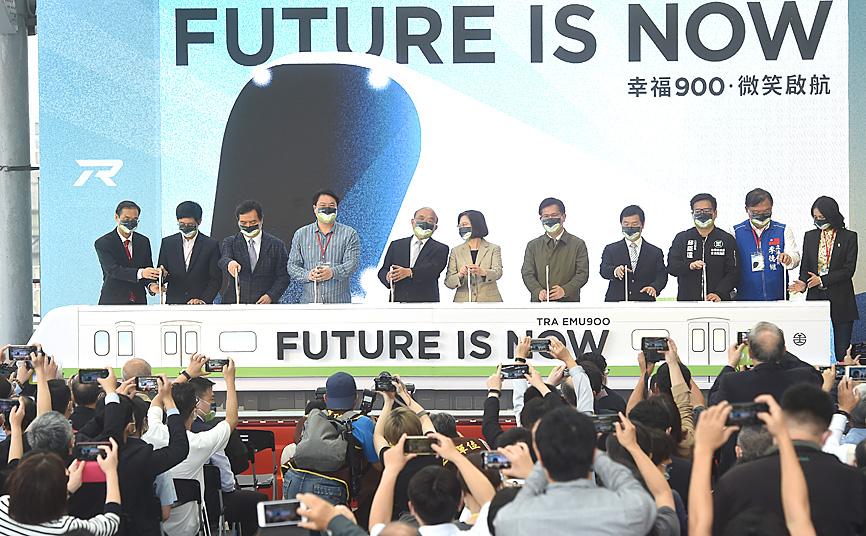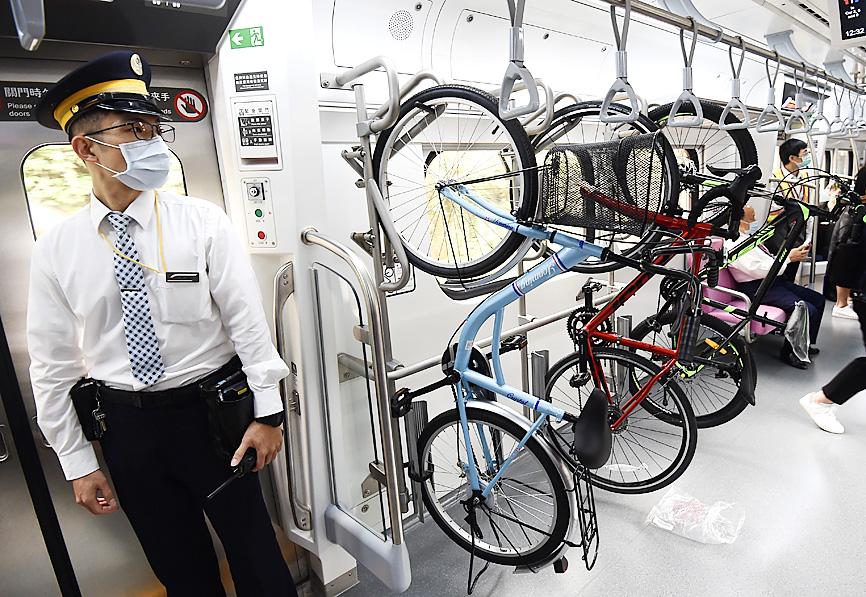The Taiwan Railways Administration’s (TRA) two new EMU900 regional trains are to begin operations on Sunday to transport travelers during the Tomb Sweeping Day long weekend.
President Tsai Ing-wen (蔡英文), Premier Su Tseng-chang (蘇貞昌) and Minister of Transportation and Communications Lin Chia-lung (林佳龍) were among the government officials yesterday afternoon presiding over the train’s inauguration ceremony at Keelung Railway Station, the starting point of the nation’s trunk line.
The two regional trains are part of the operator’s acquisition plan from 2015 to 2024, the TRA said, adding that the plan also includes the purchase of EMU3000 intercity trains.

Photo: Chien Jung-fong, Taipei Times
The addition of the regional and intercity trains to its fleet would greatly increase the agency’s capacity, and enhance the service quality for commuters and long-distance travelers, Tsai said.
“We hope that the TRA will offer quality and safe service, and demonstrate professionalism in the operation, maintenance and deployment of the trains, as well as in customer service,” she said.
New railway systems bring new development opportunities and create new communities, Su said.

Photo: Chien Jung-fong, Taipei Times
The Forward-Looking Infrastructure Development Program has earmarked NT$190 billion (US$6.66 billion) for railway projects, as they are key infrastructure for the country’s development in the next three decades, he said.
Lin said that the new trains are only the beginning, and that the TRA must ensure thorough maintenance of trains and regular trainings for its staff.
The TRA should also enhance reliability and safety, as this would constitute quality service, he said.
The EMU900’s passenger seats are light blue and priority seats are light pink.
The first and 10th cars are equipped with 12 bicycle racks.
The sixth car features priority spaces for wheelchairs that can also be used for baby strollers.
Pregnant women can request a remote control from train staff, which would allow them operate light and sound signals next to priority seats to remind other passengers to yield the seats.
Deputy Minister of Transportation and Communications Chi Wen-chung (祁文中), who also serves as acting TRA director, said that the nation’s regional trains are mostly operated with eight railcars.
However, an EMU900 would have 10 cars, increasing the capacity by 40 percent, he said.
EMU900s are manufactured by South Korea-based Hyundai Rotem.
The remaining 500 EMU900s ordered by the operator are to be delivered in three batches: 100 this year, 120 next year and 280 in 2023, the agency said.
The orders totaled NT$25.3 billion, it said.
The operator has also purchased 600 new railcars for intercity trains from Japan’s Toshiba.
“We will retire old regional trains and intercity trains based on the delivery schedules for new trains,” Chi said.

Alain Robert, known as the "French Spider-Man," praised Alex Honnold as exceptionally well-prepared after the US climber completed a free solo ascent of Taipei 101 yesterday. Robert said Honnold's ascent of the 508m-tall skyscraper in just more than one-and-a-half hours without using safety ropes or equipment was a remarkable achievement. "This is my life," he said in an interview conducted in French, adding that he liked the feeling of being "on the edge of danger." The 63-year-old Frenchman climbed Taipei 101 using ropes in December 2004, taking about four hours to reach the top. On a one-to-10 scale of difficulty, Robert said Taipei 101

A preclearance service to facilitate entry for people traveling to select airports in Japan would be available from Thursday next week to Feb. 25 at Taiwan Taoyuan International Airport, Taoyuan International Airport Corp (TIAC) said on Tuesday. The service was first made available to Taiwanese travelers throughout the winter vacation of 2024 and during the Lunar New Year holiday. In addition to flights to the Japanese cities of Hakodate, Asahikawa, Akita, Sendai, Niigata, Okayama, Takamatsu, Kumamoto and Kagoshima, the service would be available to travelers to Kobe and Oita. The service can be accessed by passengers of 15 flight routes operated by

Taiwanese and US defense groups are collaborating to introduce deployable, semi-autonomous manufacturing systems for drones and components in a boost to the nation’s supply chain resilience. Taiwan’s G-Tech Optroelectronics Corp subsidiary GTOC and the US’ Aerkomm Inc on Friday announced an agreement with fellow US-based Firestorm Lab to adopt the latter’s xCell, a technology featuring 3D printers fitted in 6.1m container units. The systems enable aerial platforms and parts to be produced in high volumes from dispersed nodes capable of rapid redeployment, to minimize the risk of enemy strikes and to meet field requirements, they said. Firestorm chief technology officer Ian Muceus said

MORE FALL: An investigation into one of Xi’s key cronies, part of a broader ‘anti-corruption’ drive, indicates that he might have a deep distrust in the military, an expert said China’s latest military purge underscores systemic risks in its shift from collective leadership to sole rule under Chinese President Xi Jinping (習近平), and could disrupt its chain of command and military capabilities, a national security official said yesterday. If decisionmaking within the Chinese Communist Party has become “irrational” under one-man rule, the Taiwan Strait and the regional situation must be approached with extreme caution, given unforeseen risks, they added. The anonymous official made the remarks as China’s Central Military Commission Vice Chairman Zhang Youxia (張又俠) and Joint Staff Department Chief of Staff Liu Zhenli (劉振立) were reportedly being investigated for suspected “serious